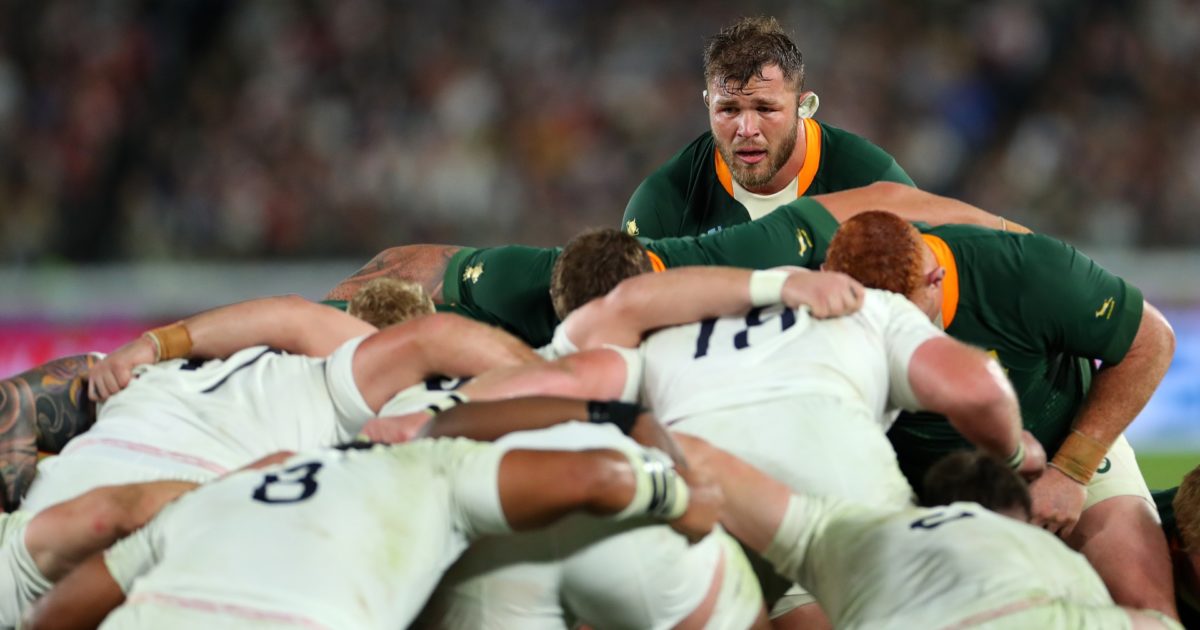World Rugby approves 10 temporary law trials to reduce Covid risk, including scrum changes and use of orange card

The World Rugby Executive Committee has approved 10 optional domestic law trials which are designed to provide national member unions with further Covid-19 transmission risk reduction measures if required.
Temporary law trials relating to the scrum, tackle, ruck and maul were approved along with a package of best-practice match hygiene measures. Each measure aims to reduce individual cumulative exposure to these contact activities, which are generally accepted as presenting the highest Covid-19 transmission risk.
Unions can apply to implement one or more of the temporary law amendments as domestic trials at elite or community levels on a needs-basis in line with the World Rugby return-to-play guidance published this month.
Recognising the fluid global Covid-19 environment, the implementation by unions will be entirely based on their territory-specific requirements and respective government advice and directives.
The trials are informed by the World Health Organisation (WHO) guidance, which determines high transmission risk as being 15 cumulative minutes within one metre of an infected person. The important considerations for rugby are:
- It is generally accepted that sustained close contact carries greater Covid-19 transmission risk than close proximity;
- It is also generally accepted that close proximity in an outdoor environment carries a lesser risk that an indoor environment;
- As transmission risk during a game is related to both physical contact and proximity, further evidence-based risk reduction should be focused on contact activities;
- While individual exposure to contact activities such as scrums, tackles, lineouts, rucks and mauls are generally within 15 cumulative minutes, further exposure reduction is possible;
- Risk reduction can also be achieved via best-practice match management, including hygiene measures, screening, testing and implementation of World Rugby’s return-to-play guidance;
- Sport should only return when safe and appropriate to do so in line with government advice.
The law trials were considered by the specialist law review group (LRG) comprising coaches, players, match officials, medics and law specialists, following a detailed analysis of 60 matches. The LRG decided against the mandatory global application of the law trials given the wide variation in the presentation and management of Covid-19 across nations.
The comprehensive game analysis enabled an evidence-based approach to develop the temporary trials that limit scrum contact and time, lower the tackle height and speed up ball distribution from rucks and from mauls.
The trials provide limits to scrum options with no scrum resets, limits for players joining rucks and mauls, time to play the ball at the base of scrums and rucks reduced from five to three seconds and only one movement permitted for a maul.
Such an approach could reduce contact exposure for tight five players by more than 30 per cent, reduce exposure at the ruck by up to 25 per cent and reduce maul contact exposure by 50 per cent. The ten changes are:
SCRUM
1. Remove reset scrum when no infringement occurs;
2. Hookers must use a ‘break foot’ to aid scrum stability;
3. No scrum option for a penalty or free kick;
4. Goal line drop out when an attacker is held up in-goal or knock on in-goal.
TACKLE
5. Reinforce high tackle sanction framework – introduction of orange card for red card high tackle offence;
6. Remove choke tackle and reward defensive team.
RUCK
7. Ruck ‘use it’ duration time reduced from five to three seconds;
8. No scrum for failure to ‘use it’ at scrum, ruck or maul.
MAUL
9. No one can join a maul if not in it from the start;
10. Only one forward movement at a maul.
World Rugby Chairman Bill Beaumont said: “World Rugby is committed to evidence-based injury and infection preventative measures and we are fortunate to have such strong medical and research structures that inform our approach.
Some encouraging views by World Rugby's main medichttps://t.co/k8FCLcTPBm
— RugbyPass (@RugbyPass) May 27, 2020
“The health and wellbeing of the rugby family is paramount. We have extensively evaluated the perceived risk areas within the game in partnership with our unions.
“This has enabled an evidence-based assessment of risk areas and playing positions, which led us to develop optional temporary law amendments, complementing the extensive return-to-play guidance we published earlier this month.
“Unions can apply to implement one or more of these amendments on a domestic basis according to the respective government directives relating to Covid-19. I would like to thank everyone for their full commitment to this process which will aid safe return to rugby activities at all levels.”
'The ball will have to be disinfected, sprayed every time it goes into touch.'
Former WR chief medic Dr Barry O'Driscoll talks candidly to @heagneyl ???https://t.co/2S6NxTB8AA
— RugbyPass (@RugbyPass) May 24, 2020
In addition to the on-field law and officiating interventions, a number of non-law hygiene measures are recommended for playing and training in line with WHO and World Rugby guidance:
- Mandatory hand and face sanitisation pre- and post-match;
- Regular ball sanitisation before, during and after matches;
- Single user water bottles/hydration;
- Changing of jerseys, shorts and headgear at half-time where possible;
- Prevention of huddles and celebrations involving contact;
- Prevention of spitting and nose clearance.
Recommended training measures:
- Forwards units: high-risk transmission activity such as an eight-person scrum should be undertaken against a machine to limit exposure, packs should be trained separately;
- Scrum and maul practice should take place at the end of a training session, preferably a day before a ‘down day’ to allow 24-48 hours before collective training;
- High transmission risk training should be avoided within 48 hours of a game.

























































